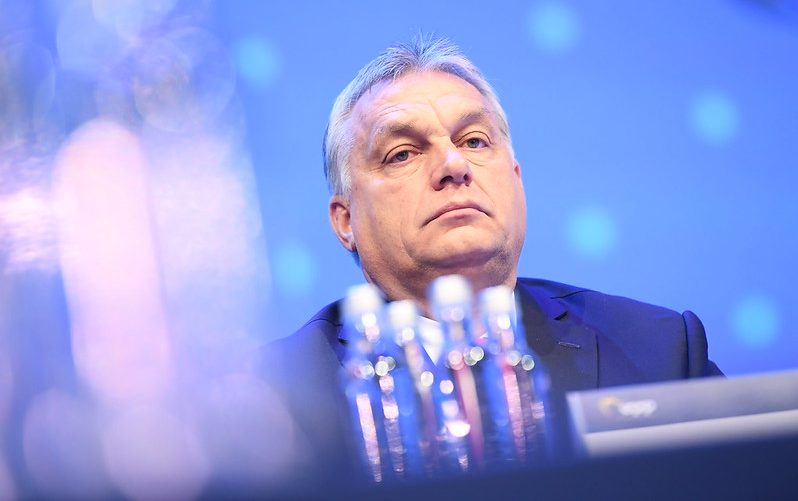On August 1st, Hungarian prime minister Viktor Orbán travelled to the United States to speak at the Conservative Political Action Conference (CPAC) in Dallas, Texas. Despite the recent outrage due to his racist remarks during a speech he gave in Romania just the week before, Orbán’s invitation to speak at the conservative conference was not cancelled. Before the start of CPAC, the Hungarian leader even got to meet Trump, who called him his “friend” and acknowledged Orbán’s expertise in world affairs.
Republicans’ sweetheart
It is commonly known that former president Donald Trump is a big fan of Viktor Orbán and vice versa. Over the past years, they mutually endorsed each other before national elections. In 2016, before the United States presidential elections, Orbán publicly endorsed Trump, the only leader in the European Union to have done so. By now, Trump has become notorious for his obvious disregard for democratic norms and his diffusion of fake news. And yet, Orbán’s support for the former president is unabated – likely because Orbán has finished in Hungary what Trump always aspired to do in the United States: rebuilding the country into a quasi-autocracy around friends and family, almost resembling an oligarchy.
Republicans’ admiration of Orbán did not stop when Trump lost power in the 2020 presidential elections. On the contrary, Republican politicians continue admiring the EU’s “illiberal” leader, who repeatedly failed to uphold basic democratic norms and EU values, and transformed the country into an only “partly free” country, according to Freedom House.
Just last year, in August 2021, American conservative TV-Talk Show host Tucker Carlson spent a week in Hungary’s capital, Budapest, to host his show from the city for the week he spent there. During his trip, Tucker Carlson praised Orbán, stating that he “is defending democracy against the unaccountable billionaires, the non-governmental organisations (NGOs) and certain western governments. He is fighting for democracy against those forces which would like to bury it.” Also, he described Hungary as a “small country with a lot of lessons for the rest of us.” In January 2022, Tucker Carlson released a mini-documentary recorded in Hungary called “Hungary vs. Soros: Fight for Civilization”, once again using Jewish philanthropist George Soros as a scapegoat for today’s challenges, thereby invoking anti-Semitic and conspiratory thoughts typically spread by the radical-right and white supremacist groups.
Then, in May 2022, CPAC was held in Budapest, Hungary. It was the first time that “this major American political franchise” arrived in Europe – a clear sign of the rapprochement between the American and the European, or at least the Hungarian, far right. During the conference, Orbán also gave a speech, calling for “a worldwide conservative takeover” and stating that “We need to take back the institutions in Washington and Brussels” and “coordinate the movement of our troops”.
According to CPAC, Hungary was chosen as the place for the first CPAC conference held in Europe due to it being “one of the engines of Conservative resistance to the woke revolution”. It also named Orbán “a true champion of the Right”.
But where does this admiration for Orbán, the leader of a small eastern European country, come from?
Doing things the “Orbán-way”
Orbán serves as a role model for the self-proclaimed “conservatives” who admire how he “fights” for and “protects” his country, and they ignore or even embrace the fascist tactics he uses along the way.
The Hungarian prime minister has been clinging to power for four terms in a row, even if due to dubious tactics: Ever since he was reelected in 2010, after being in opposition from 2002 onwards, he has implemented a system that makes it harder for his Fidesz party to lose in future elections. After winning in 2010, he allegedly also stated that he would make sure that Fidesz would never lose again in an upcoming election. And so he did make sure that this would be impossible to happen again – through various tactics such as gerrymandering and letting Hungarian “minorities” who live outside Hungary and have a different citizenship vote, a group that disproportionately votes for Orbán.
In addition to that, he also transformed the press landscape into something that rather presents one of an authoritarian state: he drastically curtailed freedom of the press by, amongst other things, closing down government-critic newspapers, enacting dubious “media laws”, and establishing an institution that oversees virtually the whole media market in Hungary. A recent prominent example of how the Hungarian media laws and these Orbán-friendly institutions negatively affected the free media in the country is the closing down of Hungary’s last free media station, Klubrádio, in 2021. Hence, ever since Orbán’s Fidesz government came to power in 2010, they transformed the whole Hungarian media landscape into a propaganda mouthpiece of the government. While Orbán does not give interviews to independent media outlets, he speaks on Hungarian state-owned radio every week. There he shares what he thinks about current events while also spreading government propaganda – somehow resembling Trump’s constant appearances on Fox News.
Moreover, Orbán devoted his past few years in office, and in particular starting in 2015, to the “fight” against immigration, making him notorious in the international community for his tough stance on migration – one of the main reasons he is extremely popular among the American right. Orbán time and again criticised the EU for its immigration policies and refused to take in refugees from the middle east. He even built a fence on Hungary’s southern border with Serbia to stop refugees from coming, leading to an outcry from EU leaders and NGOs alike. And yet, at the same time, he was also praised by right-wingers for his anti-immigration policies despite criticism from the outside – giving him the reputation of a fierce “defender” of and fighter for his homeland.
His toughness on the matter of immigration was also rewarded with admiration by leaders such as Trump, who also campaigned on an anti-immigration platform and planned to build a wall on America’s southern border with Mexico to keep immigrants out – similarly to what Orbán already had done.
Just recently, Orbán found a new issue to exploit for political gains besides immigration: LGBTQ+ rights. In the past year, the Hungarian government ordered a publisher to put a disclaimer on a book that portrayed “behaviour inconsistent with traditional gender roles” and fined a book store owner for failing to clearly indicate that this book does portray a day in the life of a child with same-sex parents. His tough stance on LGBTQ+ issues and his homophobic policies once again receive praise from conservatives in the United States. Banning or restricting certain books is just another thing that has become possible in Orbán’s Hungary, which Republicans aspire to do in the United States, too.
All in all, Orbán served as a role model for the Republican right during these past years: a leader who is not afraid to implement even the most appalling policies, say the most outrageous things, and ignore any criticism while portraying himself as a warrior against the “liberal, leftist, globalist agenda” who only seeks to protect “his people”.
But Orbán also needs the publicity and admiration from abroad: despite having won the Hungarian parliamentary election in April, he is facing some backlash at home, amongst others, due to austerity measures introduced shortly after being reelected. In July, protesters took to the streets for several days due to tax changes introduced by the government that would hurt small businesses.
Moreover, Orbán has become somewhat of a pariah in Europe, having lost even his last ally in the EU, Poland, due to his Putin-friendly behaviour and rhetoric after the Russian war in Ukraine started in February 2022. Therefore, Orbán desperately needs recognition from abroad to show Hungarians at home how popular and liked he is in other countries, to give him some credibility and endorsement. Trump openly admiring the Hungarian leader and calling him a “friend” when meeting with him gives Orbán credibility and popularity, in particular among other illiberal, populist leaders and the public supporting these politicians. Steve Bannon, Donald Trump’s former chief strategist, even called him “Trump before Trump“, exemplifying the strong admiration American Republicans and Conservatives have for Orbán and his strategic dismantling of democracy.
But now, back to CPAC and the far-right Hungarian’s appearance at the conference, who has just recently come under fire after a speech he gave in Romania that has been called a “pure Nazi speech” by one of his long-serving advisors.
During his speech at CPAC, Orbán addressed the most salient issues that unite the American and the Hungarian right and which they share. Among these are: immigration, LGBTQ+ rights, same-sex marriage and transsexuality, as well as the fight against the “progressive”, “woke”, “liberal left”.
“The globalists can all go to hell”
Orbán opened his CPAC address by comparing the two states, Texas, the lone star state, with Hungary, the “lone star state of Europe”. He then also referred to himself as a “freedom fighter”, the only anti-immigration political leader on the European continent and the leader “of a country under siege by progressive liberals day by day”. There, he already addressed two critical issues for American conservatives: anti-migration policies, which he has become notorious for, and progressive liberals, typical scapegoats for the far right.
Throughout his speech, he portrayed the “globalists”, progressives, and liberals as the main enemy of (Christian) conservatives like himself and Republicans. He then proceeded to mock the leftist media, stating that calling him racist and an antisemite is “fake news”, a phrase that resonates with the audience as it was also often used by Trump. According to Orbán, those accusing himself of racism and antisemitism are also simply “idiots”. He continued by arguing that progressive NGOs are also “probably confused”, and he made fun of them for writing their research papers on how he destroyed Hungary’s democracy.
Perhaps most importantly, Orbán made clear early on in his speech that the Hungarian and American conservatives should unite forces. According to him, conservatives are under attack and need a “total defense”, and Hungarians can show them how to fight back according to their own rules. For that, he gave several examples, among them immigration since, as he elaborated, Hungary has been the first nation in Europe to stop the “invasion of illegal migrants” and said “no” to illegal migration.
Furthermore, the Hungarian strongman addressed family policies, which are allegedly the heart of his politics, and he went on a tirade on the need to protect “traditional families” – in reference to the LGBTQ+ community, which, according to Orbán and other right-wing politicians, do not represent “traditional families”. In this regard, he also mentioned that the number of abortions in Hungary has halved, receiving cheers from republicans, given that this is a salient issue in American politics and in particular in focus since the overturn of Roe v. Wade this May.
Orbán also talked about the political fight against “gender hysteria” and the “LGBTQ+ lobby”, as he calls them – also two polarizing issues in American politics.
He continued to talk about marriage, quoting the Hungarian constitution, which states that marriage should be a union between a man and a woman – thereby ostracising same-sex marriage, yet another diving issue among the American political left and right. He further argued that family ties should be based on marriage or the relations between parents and their children – and that the mother should be a woman and the father a man, portraying the LGBTQ+ community once again as an enemy.
In line with his previous homophobic rhetoric, he addressed the “sexual orientation programs” that his government rejects and insisted they “leave our kids alone” – thereby most likely referring to his homophobic legislation, also known as “paedophilia law“, that wrongly conflates homosexuality with paedophilia. Unsurprisingly though, among Conservatives, his statement received loud applause and cheers.
Drawing on the topic of, as Orbán always calls it, “gender hysteria”, he states that they had decided that they did not need more genders and then joked, “less drag queens, more Chuck Norris”.
Orbán also mentioned the war in Ukraine and, surprisingly enough, declared that Hungary stands in full solidarity with Ukraine. In addition, he found more unambiguous words for the war than usual, stating that the attack of Russia forced close to one million refugees to Hungary. However, he then proceeds to argue that the “globalist leaders’ strategy escalates and prologues the war” and that we needed a strong America with a strong leader – assumingly, meaning someone else than Biden, and instead someone like Trump or any other Republican.
Lastly, he declared that “Globalists can go to hell”, once again naming one of the main scapegoats of today’s far right.
Conclusion
The recent cooperation between Orbán and American conservatives speaks for a growing affinity between the American and the European far right. This could, potentially, turn out to be a problem for democracy in the future: if the American leadership changes with the upcoming midterm and presidential elections back to Republicans, who, considering the January 6 attack on the capitol and their admiration for anti-democratic strongmen like Orbán, seemingly have no problem with dismantling democratic norms and values, growing cooperation between these far-right actors could accelerate the process of the global decline in democracy even further.
As the good relations between Trump and Orbán, as well as between Orbán and American Republicans, also show, the Hungarian prime minister is a welcome guest at Conservative gatherings. With his policies and his outlook on certain polarising issues such as LGBTQ+ rights, abortions and immigration, he has hit the spot for the American right. Republicans admire Orbán for his tough stance on certain issues and see him as a freedom fighter against the “left, woke, liberal” camp. At the same time, they overlook the anti-democratic path Orbán has taken as the leader of Hungary – or, perhaps, they even aspire to do the same in the United States.
Either way, the admiration Orbán receives from across the pond not only gives him more credibility at home and presents him as a leader capable of keeping up with the “big states”. It also bolsters his ego and encourages him to continue defending his path of illiberalism and dismantling Hungarian democracy further.
In the end, Obán is able to go back home and tell the Hungarian people what a great leader he is and how admired he is abroad. And what is more credible than a compliment from U.S. politicians?








Be First to Comment